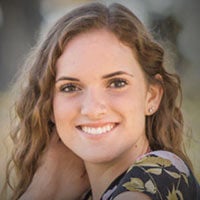By Isabel Grant-Funck
I will always remember the first day I met Drew. I was 16 and had years of babysitting under my belt. I had been involved in the special needs community my whole life, as my cousin has Down syndrome and one of my best friends from school does, too. I had several classmates with disabilities, with whom I interacted frequently. I wasn’t nervous to start my job. I was ready for everything to go smoothly. I mean, how could it not?
I met Drew and his parents in their driveway. We talked for a few minutes, but Drew was eager to go on a bike ride, which he had been promised. Drew is overall nonverbal, except for the occasional request for one of his favorite things, such as “grilled cheese,” “Thomas” (as in Thomas the Tank Engine), or “bike ride.” We started out on our ride. I didn’t know the neighborhood well, but Drew obviously did. When I would tell him to turn right, however, he would turn left. When I said it was time to turn around, he would keep going. I wanted him to like me. I wanted him to listen to me. I wanted to be the perfect caretaker. I soon saw that I had a lot to learn.
There is a lot of advice I have to give to other babysitters or caretakers of someone with ASD, or similar conditions like Fragile X syndrome. But, the first that comes to mind is to remind yourself that each day will be a learning experience. No matter how much research you do, no matter how prepared you think you are, there will always be unexpected situations that arise.
I have come to know that while I can see Drew for the full individual that he is — precious, feisty, and loving — not everyone has the eyes to see him that way.
Keep in mind, too, that other people might not understand that the child you’re caring for has a disability. Occasionally, if Drew is faced with frustration or disappointment, he will scream and cry at the top of his lungs or cling to me in distress, and he won’t care who’s watching. When I started caring for him over four years ago, I’d feel embarrassed at moments like these, moments when people would turn and stare. I would feel anger rising within me. I wished strangers would stop judging us, stop looking at us, and mind their own business. Eventually, I got used to these invasive eyes and no longer am bothered when people stare. I have come to know that while I can see Drew for the full individual that he is — precious, feisty, and loving — not everyone has the eyes to see him that way.
I should note that, when we’re in public, we aren’t always faced with judgement when Drew is having a bad day. There have been countless times that I have been surprised with the love and acceptance that some extend to Drew.
Once, we were biking and upon passing his favorite ice cream shop, Drew turned into the parking lot. I tried to explain to him several times that I didn’t have my wallet and promised that we could return later in the car. We stood outside the store, Drew screaming and crying, as I tried to calm him down. I felt the prying eyes of people passing by. The weight of strangers’ judgment was heavy, and I just wanted the moment to end. After a few minutes, however, the owner of the store came outside and gently offered Drew whatever he wanted for free. Drew calmed down, the owner welcomed him, gave him the largest scoop, and sent us on our way. Moments of unity like this mean a lot.
The key to caring for children with disabilities is to love them, show them they are worthy in a world that often pushes them aside, and keep them safe.
The key to caring for children with disabilities is to love them, show them they are worthy in a world that often pushes them aside, and keep them safe. Truly see your kid as the complex, valuable person that they are. When taking on the job as a caretaker to someone with a disability, it’s not just a job, it’s taking on the job of being an advocate and showing the world that your child is exactly who they should be, no apologies necessary. Being Drew’s caretaker has been one of the most meaningful jobs I’ve ever had. I’ve learned empathy, patience, how to deal with the unexpected, and much, much more.
author

Isabel Grant-Funck
Isabel served as an intern at the National Fragile X Foundation for the summer of 2020. She is a student at Johns Hopkins University, majoring in Public Health Studies with minors in Spanish and Marketing. She has a special place in her heart for individuals with special needs.

